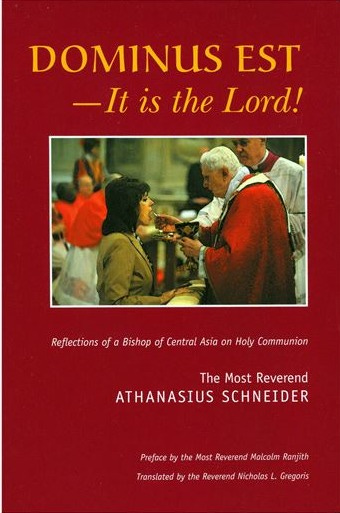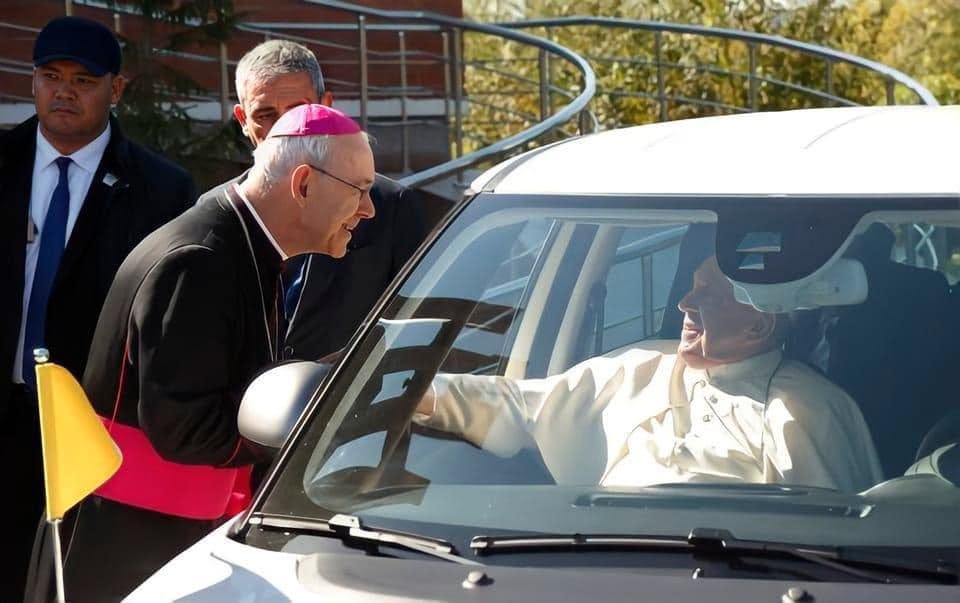Only the Truth Will Give You Joy and True Happiness
Interview with Bishop Athanasius Schneider, September 16, 2024
His Excellency Bishop Athanasius Schneider, O.R.C, has been referred to in the National Catholic Register as “one of the leading voices of fidelity, continuity, and tradition in the Church today.” Many devout Catholics are well acquainted with and relieved to see Bishop Athanasius Schneider's strong and consistent affirmation of the traditional teachings of the Catholic faith.
As I wrote about Bishop Schneider in an article for Homiletic and Pastoral Review after I interviewed him for the first time in 2018:
"In some ways, it is hard to account for the scope of his influence, in light of the fact that Bishop Schneider is auxiliary bishop of Astana, in Kazakhstan, a country with only around 150,000 Roman Catholics. Even though Kazakhstan is the world’s ninth-largest country, many have never even heard of it. And so, it is a bit of a marvel that, in spite of the relative humble obscurity of his role as an auxiliary bishop serving in that less-than-famous locale, Bishop Schneider is invited so often to appear in so many far-flung places."
More recently, on September 16, 2024, Bishop Schneider stopped in San Francisco during a book tour to promote his two latest books, which are being published by Sophia Press: Flee from Heresy: A Catholic Guide to Ancient and Modern Errors and Credo: Compendium of the Catholic Faith. A Credo Study Journal is also available.
SCROLL DOWN FOR MORE
“My book is obviously necessary because of the confusion in our day in the life of the Church, the spreading of so many heresies or errors, half-truths, and ambiguities. Therefore, I made an overview of all heresies which existed since the beginning, to show that all the heresies spreading today were already present in past centuries.”
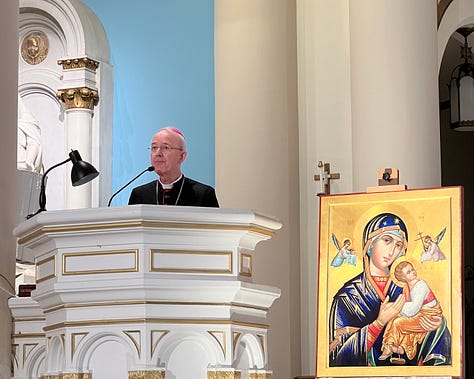
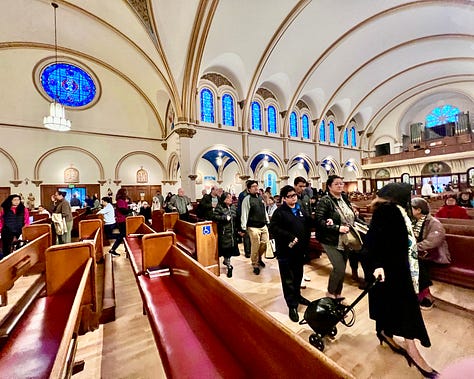
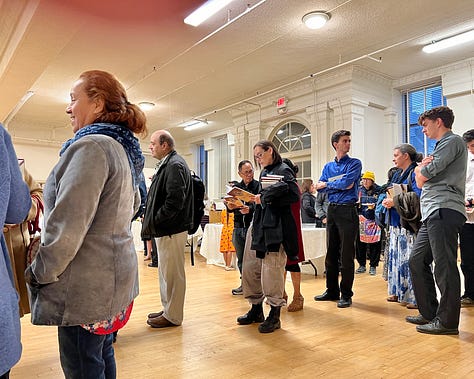
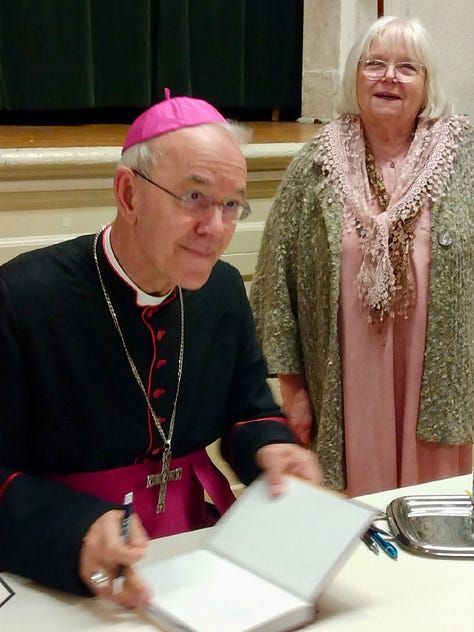
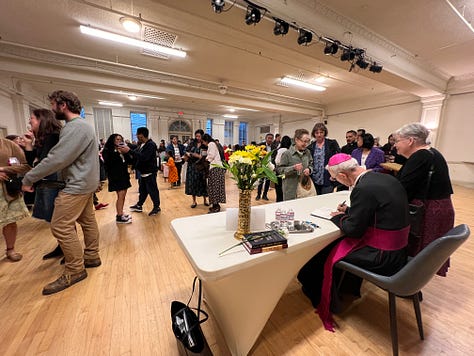
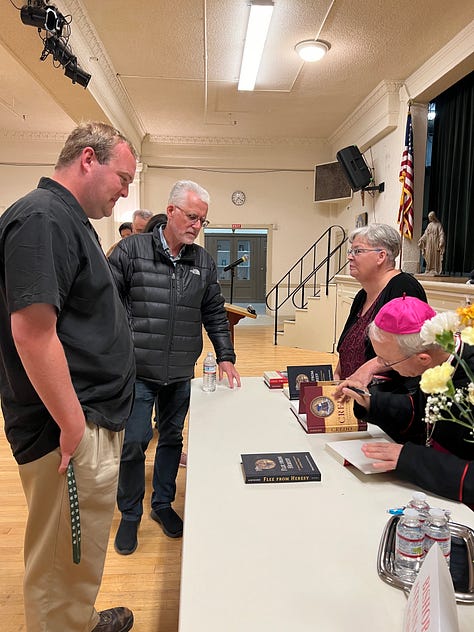

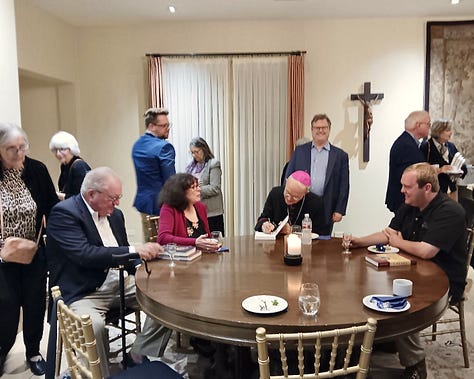
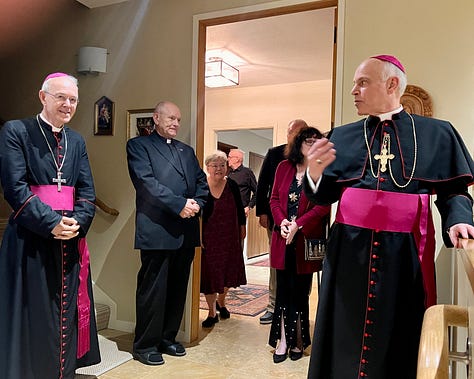
During a talk at Star of the Sea Church, his Excellency spoke about how he was asked by lay Catholics to write these books, and that he took on the difficult task because it is the role of the Catholic bishop to fulfill his public oath: "To preserve the entire and immutable deposit of the faith." Another one of his goals is to console faithful Catholics disturbed by false teachings and to reassure them that God permits errors, in part to spur the Church's members onward to greater knowledge of the truth.
Q: Your Excellency, it is a great honor to speak with you again. When we last talked in 2018, you spoke about your childhood, and how it was spent with your German expatriate family living in a gulag in the former Soviet Union. I was moved by learning of the sacrifices your family made to get to Mass by train, even though you could go only once a month because of the Soviet restrictions on religion and because of the expense.
I was also moved by how shocked and sad you were at the age of 12 when after your family immigrated to the West, you saw people taking the Eucharist from the unconsecrated hands of laity into their own hands.
You wrote that you carried this pain in your soul. And years later that led to your book Dominus Est—It is the Lord, in which you defended the Eucharist.
Is defense of the Eucharist still a major goal of your ministry?
A: Of course.
The Eucharist is the heart of the church. And when the heart is weak, then the entire life of the Church is weak, as it is in our day. The deepest wound in the life of the church is the Eucharistic wound—that's to say the enormous disrespect, irreverence, and superficiality with which the body of Christ is treated during the distribution and reception of Holy Communion.
With such a superficial practice of receiving Communion in the hand and also with a lack of preparation through Confession to purify the soul, comes also a loss of faith in the Real Presence of the Lord in the Holy Host. For a large part of the Catholics who practice Communion in hand, the Holy Eucharist has come to be seen just as bread, just as a symbol.
This is one of the greatest expressions of the wound of the Church, such a lack of faith. This goes together with a superficial treatment of the Holy Eucharist and its influence in our weakening of the faith. These two aspects are interdependent.
There is also the crisis of the Eucharistic liturgy in general. To a large extent in Catholic Churches, the Holy Mass is celebrated in a very superficial manner, like a social congregational event, in a very anthropocentric style, in a Protestant style, where the word is dominant and not the sacrifice.
The Holy Mass is substantially the Real Presence of the sacrifice of the Cross. But this is very much obfuscated through the superficial anthropocentric style of celebrating the mass that is so prevalent in the life of the church of our day.
Therefore, to defend the Eucharist is, in my opinion, still the first and most urgent pastoral task.
Q: Surveys confirm that a disheartening number of people who are at least nominally Catholic do not believe that Jesus is actually present in the Eucharist. They've either never heard the true teaching, or they choose not to believe it. Many efforts are being made to change this.
You may know that this past summer the United States Catholic Church arranged for four nationwide Eucharistic Processions to start from four compass points ending at the National Eucharistic Congress in Indianapolis. Thousands of Catholics joined the processions, and tens of thousands more witnessed the Eucharist reverently on display during the processions. What do you think of this approach?
A: I very much welcome this initiative in the United States, and I wish that this should be imitated in other countries as well, because such processions are a visible witness of our true faith in the Real Presence of the Lord and his central importance in the life of the Church. We must go out and visibly witness Christ incarnated and show the Eucharistic Christ present among us. These processions are a catechesis for many people who don't know the Eucharist's real meaning. Even people who are not Catholics and who witness such processions can be touched and moved by the spiritual power of our signs, our expressions of reverence, and of faith toward the Holy Eucharist.
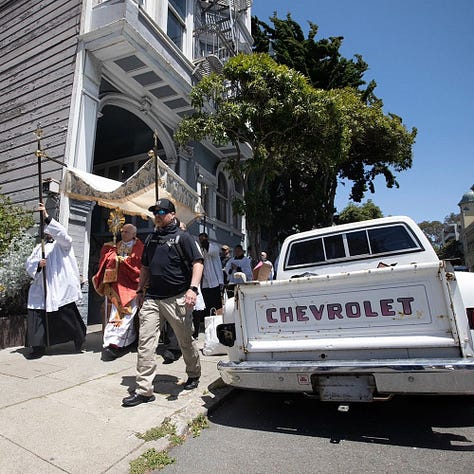
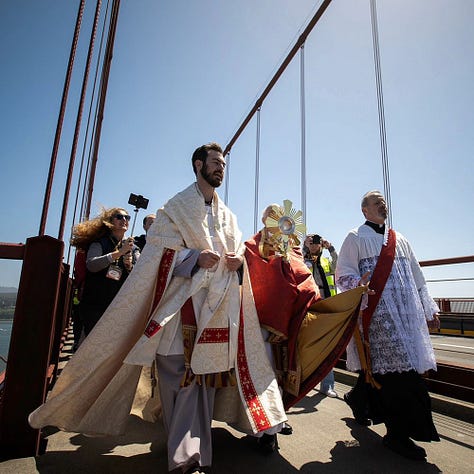
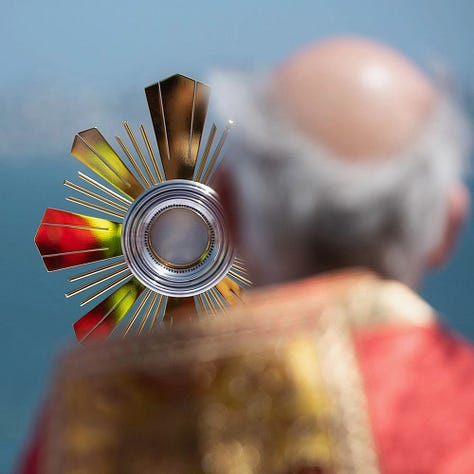
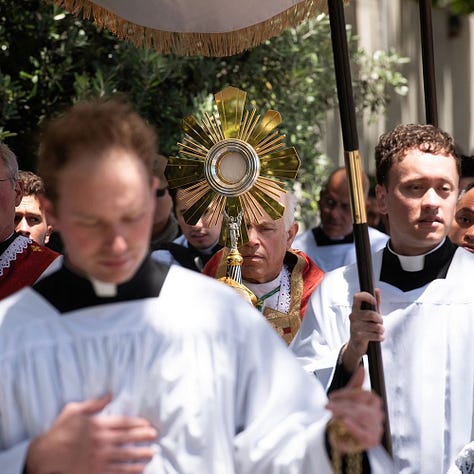
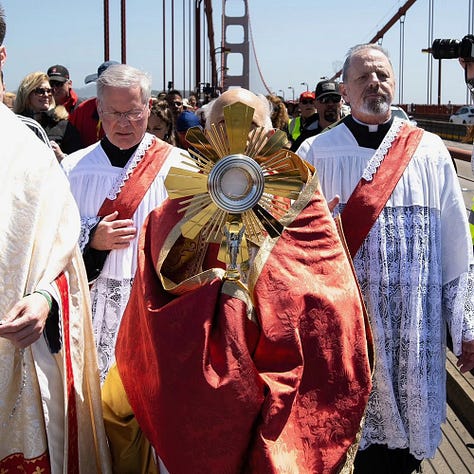
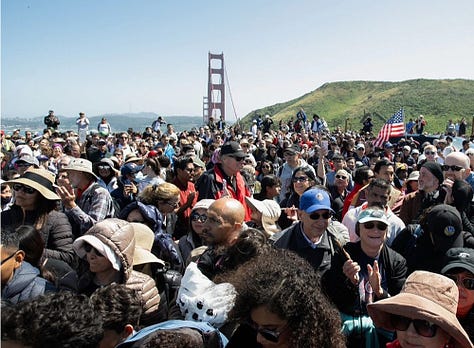
There are many examples in the history of the church where Protestants and even Jewish people converted when they were witnessing a Eucharistic procession in public in the streets. So we need to be more courageous and should not be afraid to manifest publicly our love and our reverence for the Holy Eucharist through public processions.
Q: Two little stories to corroborate what you just said. The Junipero Serra route of the National Eucharistic Procession started at St. Mary's Cathedral in San Francisco. So I took an Uber from San José that day to the cathedral, and it took two and a half hours instead of the usual one hour because there was a foot race. On the way, I had a lively talk with a taxi driver who was some sort of nondenominational Christian, who leads youth groups. He witnessed that he used to be a cocaine addict, but Christ helped him turn his life around. He was intrigued when I told him we Catholics believe that Jesus is in the Eucharist and in a few hours the archbishop was going to take the Eucharist across the Golden Gate Bridge. And he said, "Oh wow. I know all the stuff that usually goes on in that bridge. Jesus on the Golden Green Bridge. That's really amazing."
And the Buddhist aunt of one of the Benedict XVI staff was driving across the bridge when the Eucharistic procession was going on, with—some say—3000 people, and afterward she told her nephew she could feel the peace. So those are a few local examples of the power of the Eucharist reaching non-Catholics in public processions, which may bear fruit in conversion later on.
Do you have processions like that in your Archdiocese?
A: In Kazakhstan, we cannot do public processions in the streets because it's not allowed by the government. Any religious manifestations outside the church compound are forbidden. But we can have them inside our church territory, around the church with the Holy Sacrament.
Q: Do you have any other ideas about what can be done to further that aim?
A: First, we must transmit to the children, the youth, and even to adults, the integral, complete, sure, traditional doctrine on the Eucharist. Also, we need to teach about the Eucharistic saints who are examples of impressive love and reverence towards the Eucharist. In addition, we need to speak about Eucharistic martyrs who died because of their faith in the Eucharist, and about Eucharistic miracles. After teaching and instructing people, then we need to promote Eucharistic Adoration, with Solemn Exposition of the Blessed Sacrament in the monstrance, for several hours in the parishes. If possible, Perpetual Adoration, 24 hours every day.
I consider Perpetual Adoration is the greatest hidden power in the life of the church.
Q: Can you do that where you are?
A: In my cathedral [of Our Mother of Perpetual Help in Astana, Kazakhstan], we have held Perpetual Adoration for 22 years without interruption day and night in a special Adoration Chapel, and the entire diocese takes part in this adoration. We have a schedule where every night another parish comes and spends the night in adoration.
Q: After Pope Francis visited your country in September 2022, America magazine published an article titled ‘There is only one true religion’: Kazakh bishop says his criticisms of Pope Francis' interfaith outreach are a sign of collegiality." The writer claimed that during Pope Francis' visit, you criticized the Pope for promoting a supermarket of religions. Is that true? I saw a photo of you shaking his hand through his car window during his visit, and you were both smiling at each other.
A: Of course. I was greeting him and he was kind to me.
I was asked during the Pope's visit by the journalists of Reuters and Crux if they could ask me some questions and I agreed. Then they asked me, "What do you think about the interreligious meeting in Asana where the pope is participating?" It was titled the Congress of Leaders of World and Traditional Religions. Almost all religions were present.
When they put this question to me, what I should answer? I should answer according to my conscience. I could not make a fictitious answer. It would be unworthy for a Catholic bishop and for my conscience. And therefore I said, "This should not be done. The Pope should not participate in such interreligious meetings, because it is promoting relativism. It is relativizing the uniqueness of our Lord Jesus Christ as the only savior. Such meetings leave an impression of a supermarket of religions." Those were my actual words.
We can promote in other ways meetings with people from other religions, which can be better on a local level as a kind of dialogue in the life of friends. This would avoid transmitting the impression of relativism.
Q: That event is quite related to the Pope's recent statement in Singapore.
"All religions are paths to reach God. They are—to make a comparison—like different languages, different dialects, to get there. But God is God for everyone."—Pope Francis during an interreligious meeting at Singapore's Catholic Junior College, September 13, 2024.
The plain meaning of his words seems to promote a blatant kind of religious indifferentism. When Pope Francis says all religions are paths to reach God, that conveys the idea that it does not matter which religion one follows. Is there another more charitable way to look at these words?
“Jesus said whoever will not believe in Me and be baptized will be condemned. In God's words, this is the only way to salvation. Of course, people who are not Christians through no fault of their own and who have invincible ignorance, they will be saved by ways which only God knows. But this does not mean that other religions are ways to God.”
A: No, it is plain. We cannot deny the reality of what we see and hear as most people did in the famous legend of the emperor's new clothes. You have to be the child who says, "No, the king is naked."
These words are contrary to the first commandment of God and to the entire New Testament because Christ is the only way, the exclusive way to salvation. After Christ came, God commanded all humanity to believe in His incarnated Son.
God said in the Baptism of the Lord, "This is my beloved son. Listen to him." Jesus also said, "No one can come to the Father except through me." Also, in the last verses of the gospel of Mark, Jesus said whoever will not believe in Me and be baptized will be condemned. In God's words, this is the only way to salvation. Of course, people who are not Christians through no fault of their own and who have invincible ignorance, they will be saved by ways which only God knows. But this does not mean that other religions are ways to God. God expressively forbade us to have other religions in the First Commandment.
Q: Let's talk about your book, Flee Heresy. For those who may be unfamiliar with the term, What is a heresy?
A: A heresy is basically a deflection, a turning away from the right path. Heresy is a corruption of the truth. It's like a virus that attacks the body and over time destroys our health and weakens us.
The word "heresy" comes from the Greek word hairesis, which means "choice." So it is a defective choice. It is a disobedience to the revelation of God because the heretic prefers his own subjective egoistic choice rather than the objective voice of God in the truth.
Q: What motivated you to write the book about heresies at this time?
A: It is evident that we are living in a time without precedent.
Q: I know it's bad, but many people say, oh, it used to be bad in other times in the past. Do you see it as unique?
A: There is unprecedented confusion about doctrine within the life of the church, never before seen to such an extent. The other comparable crisis was the fourth century, the Arian crisis, Arianism, which denied the divinity of Jesus Christ, and by this, denied the truth of the Holy Trinity. It caused a huge confusion and mess in the church for 60 years.
And now we have even worse doctrinal confusion within the church because now not only one truth is being attacked. Today the concept of truth itself is attacked and denied. This is total relativism. Relativism says that there is no truth because you can choose your own truth.
We are living with an impressive global relativism within the church. It is the last fruit of the modernism movement from the nineteenth century and the beginning of the twentieth, which was condemned by Pius X and characterized as the synthesis of all heresies.
The triumph of modernism at all levels within the church is a denial of any permanent immutable truth, in doctrine, in dogma, in morals, and in liturgy.
One of today's most dangerous expressions of relativism is exactly what Pope Francis said in Singapore, that all religions are ways and paths to God. Saying this puts the truth and its opposite at the same level. For example, even though Muslims deny the divinity of Christ and the Holy Trinity, if you say Islam is just as good as Catholicism, then you put both truth and denial of truth at the same level.
My book Flee from Heresy is obviously necessary because of the confusion in our day in the life of the church, the spreading of so many heresies or errors, half-truths, and ambiguities. Therefore, I made an overview of all heresies which existed since the beginning, to show that all the heresies spreading today were already present in past centuries in some way, and to warn people against the reappearances of such old errors. In the third part, I put some topical errors of our day in question and answer form. In the last chapter, I wrote of our Lady as the destroyer of all heresies.
For example, even though Muslims deny the divinity of Christ and the Holy Trinity, if you say Islam is just as good as Catholicism, then you put both truth and denial of truth at the same level.
Q: I'm intrigued by one of your appendices, which is the “Declaration of Truths.” Why do you think this is needed?
A: Well, as we already spoke about the unprecedented doctrinal confusion and relativism, it is my duty as a bishop, as a member of the magisterium of the church and the College of Bishops to give in these confused, dark times, a help to the faithful to simply restate what the church always taught. We specified in this declaration, forty main points in the current life of the church, which are disfigured, and corrupted.
I am also here to speak about my second book, Credo: Compendium of the Catholic Faith.
Q: A lot of people I met in my diocese would make remarks like the Catechism, the one that came out under Pope John Paul II was a pre-Vatican II document. They didn't like because it declared truths that they were trying to undermine. But also, I think on the other hand, some people find it's not as precise about some things that should be more precise about.
So that's one reason I admire your work that God has led you to do, which is to go and speak the truth and speaking the truth to power. That's a slogan right now, and it's usually used for people that are trying to undermine society.
But you are speaking the Church's truth to the people that have the power, that have the mind share, and you're doing it out of love. Can you to talk about how this is not meanness and it's not being controlling, but it's bringing the love of God to people?
A: To transmit the truth is one of the most noble and greatest expressions of love for neighbor, because every soul is thirsting for truth and only for truth. Our Lord Jesus Christ said, "The truth will set you free." Only the truth will give you joy and true happiness. Jesus Christ said, "I am the truth." And therefore, to transmit to people the truth is one of the greatest works of charity and love for me.
This interview was published originally in the Christmas 2024 issue of Latin Mass Magazine, and it is republished here with permission.






